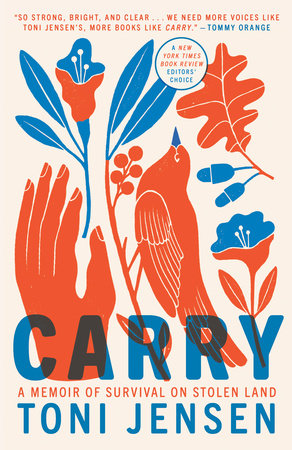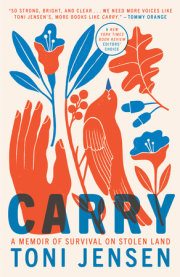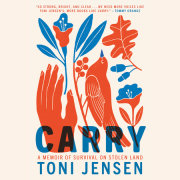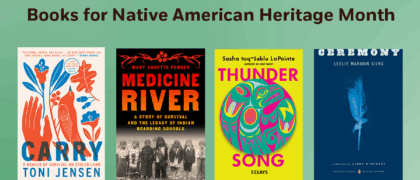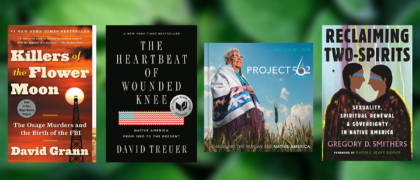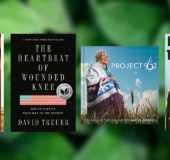OneWomen in the FracklandsI.
On Magpie Road, the colors are in riot. Sharp blue sky over green and yellow tall grass that rises and falls like water in the North Dakota wind. Magpie Road holds no magpies, only robins and crows. A group of magpies is called a tiding, a gulp, a murder, a charm. When the men in the pickup make their first pass, there on the road, you are photographing the grass against sky, an ordinary bird blurring over a lone rock formation.
You do not photograph the men, but if you had, you might have titled it “Father and Son Go Hunting.” They wear camouflage, and their mouths move in animation or argument. They have their windows down, as you have left those in your own car down the road. It is warm for fall. It is grouse season and maybe partridge but not yet waterfowl. Despite how partridge are in the lexicon vis-à-vis pear trees and holiday singing, the birds actually make their homes on the ground. You know which birds are in season because you are from Iowa, another rural place where guns and men and shooting seasons are part of the knowledge considered common.
Merriam-Webster’s Collegiate Dictionary defines in season in relation to timing, levels of fitness, and whether a thing is “legally available to be hunted or caught.” The first use of off-season comes in 1847. Definitions include:
1: a time of suspended or reduced activity, especially: the time during which an athlete is not training or competing
2: a period of time when travel to a particular place is less popular and prices are usually lower
3: sports: a period of time when official games, tournaments, etc., are not being played
Magpie Road lies in the middle of the 1,028,051 acres that make up the Little Missouri National Grassland in western North Dakota. Magpie Road lies about two hundred miles north and west of the Standing Rock Reservation, where thousands of Indigenous people and their allies have come together to protect the water, where sheriff’s men and pipeline men and National Guardsmen have been donning their riot gear, where those men still wait, where they still hold tight to their riot gear.
If a man wears his riot gear during prayer, will the sacred forsake him? If a man wears his riot gear to the holiday meal, how will he eat? If a man enters the bedroom in his riot gear, how will he make love to his wife? If a man wears his riot gear to tuck in his children, what will they dream?
Magpie Road is part of the Bakken, a shale formation lying deep under the birds, the men in the truck, you, this road. The shale has been forming over millions of years through pressure, through layers of sediment becoming silt. The silt becomes clay, which becomes shale. All of this is because of water. The Bakken is known as a marine shale—meaning, once, here, instead of endless grass, there lay endless water.
Men drill down into the shale using water and chemicals to perform the act we call hydraulic fracturing or fracking. The water-chemical mix is called brine, and millions of gallons of it must be disposed of as wastewater. In the Bakken in 2001, more than a thousand accidental releases of oil or wastewater were reported, and many more go unreported. Grass won’t grow after a brine spill, sometimes for decades. River fish die and are washed ashore to lie on the dead grass.
There, just off Magpie Road, robins sit on branches or peck the ground. A group of robins is called a riot. This seems wrong at every level except the taxonomic. Robins are ordinary, everyday, general-public sorts of birds. They seem the least likely of all birds to riot.
When the men in the truck make their second pass, there on the road, the partridge sit their nests, and the robins are not in formation. They are singular. No one riots but the colors. The truck revs and slows and revs and slows beside you. You have taken your last photograph of the grass, have moved yourself back to your car. The truck pulls itself close to your car, revving parallel.
You are keeping your face still, starting the car. You have mislabeled your imaginary photograph. These men, they are not father and son. At close range, you can see there is not enough distance in age. One does sport camouflage, but the other, a button-down shirt, complete with pipeline logo over the breast pocket. They are not bird hunters. This is not a sporting moment. The way time suspends indicates an off-season moment. The one in the button-down motions to you out the window with his handgun, and he smiles and says things that are incongruous with his smiling face.
II.
The night before, in a nearby fracklands town, you stand, with your camera, in your hotel room doorway. You left Standing Rock for the Bakken, and the woodsmoke from the water protector camps still clings to your hair. You perform your fracklands travel protocol, photographing the room—the bedspread and desk, the bathroom. In your year and a half of research for your novel, of driving and talking to women in the fracklands, you have performed this ritual, this protocol, dozens of times. Women are bought and sold in those rooms. Women are last seen there. You upload the photos onto a website that helps find women who are trafficked, who have gone missing.
The influx of men, of workers’ bodies, into frackland towns brings an overflow of crime. In the Bakken at the height of the oil and gas boom, violent crime, for example, increased by 125 percent. North Dakota attorney general Wayne Stenehjem called this increase in violent crime “disturbing,” and cited aggravated assaults, rapes, and human trafficking as “chief concerns.”
In each place, each frackland, off each road, you wait until checkout to upload the photos of the rooms. In the year and a half of driving and talking and driving and talking, if you’ve learned nothing else, you’ve learned to wait. Because it is very, very difficult to sleep in a hotel room once you learn a woman’s gone missing from it.
III.
In the Marcellus Shale in Pennsylvania, a floorhand shuts the door to his hotel room, puts his body between the door and a woman holding fresh towels. A floorhand is responsible for the overall maintenance of a rig. The woman says to you that he says to her, “I just want some company.” He says it over and over, into her ear, her hair, while he holds her down. She says it to you, your ear, your hair. She hates that word now, she says, company. A floorhand is responsible for the overall maintenance of a rig. A floorhand is responsible.
But who is responsible for and to this woman, her safety, her body, her memory? Who is responsible to and for the language, the words that will not take their leave?
In a hotel in Texas, in the Wolfcamp Shale, you wake to the music of the trucks arriving and departing. This hotel is shiny tile and chrome bathrooms. It is a parking lot overfilled with trucks, with men from the fields who have an arrangement with management. An arrangement can mean flowers in a vase. An arrangement can mean these men pay for nothing, not even a room. In the morning, the parking lot is all trash can. Beer bottles and used condoms and needles, the nighttime overflow.
In a hotel in Texas, in the Permian Basin, you report to the front desk re: the roughneck in the room above. You dial zero while he hits his wife/his girlfriend/the girl he has just bought. You dial zero while he throws her and picks her up and starts again. Or at least, one floor down, this is the soundtrack. Upon his departure, the man uses his fist on every door down your hall. The sound is loud but also is like knocking, like hello, like Anybody home? You wonder if he went first to the floor above but think not. Sound, like so many things, operates mostly through a downward trajectory.
At a hotel where South Dakota and Wyoming meet, you are sure you have driven out of the Bakken, past its edge, far enough. The highway that night belongs to the deer, though they are not yet in season. All forty or fifty of them stay roadside as you pass. You arrive at the hotel on caffeine and luck. The parking lot reveals the calculus of your mistake—truck after truck after truck, and a hotel clerk outside transacting with a young roughneck. Their posture suggests a shared cigarette or kiss or grope—something safetied through vice or romance or lust. You’d take it. But here the posture is all commerce, is about the positioning of the body close so money can change hands. You are in a place that’s all commerce, where bodies never go out of season, where bodies are commerce only.
When two more roughnecks stagger into your sight line, the hotel clerk and her partner are heading inside. She meets your eyes like a dare. The staggering man is drunk, the other holding him up while he zips his fly. This terminology, fly, comes from England, where it first referred to the flap on a tent—as in, Tie down your tent fly against the high winds. As in, Don’t step on the partridge nest as you tie down your fly. As in, Stake down your tent fly against the winter snow, against the rubber bullets, against the sight of the riot gear.
The men sway across the lot, drunk-loud, and one says to the other, “Hey, look at that,” and you are the only that there. When the other replies, “No, I like the one in my room just fine,” you are sorry and grateful for the one in an unequal measure.
Copyright © 2020 by Toni Jensen. All rights reserved. No part of this excerpt may be reproduced or reprinted without permission in writing from the publisher.

